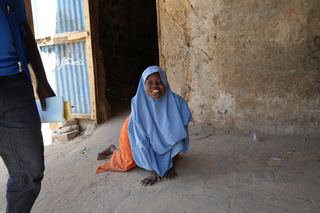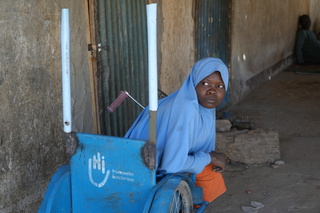When she was barely a year old, Roumanatou reacted badly to a poorly administered medical treatment; she was left with paralysis in both her legs. Thanks to the support of one man, a community leader with disabilities, Roumanatou was enrolled in school. As a result of her hard work and enthusiasm, she is now in 8th grade and making good progress. HI has provided her with school supplies and a tricycle to enable her to get around on her own.
The support of a father figure
 As a child, Roumanatou learnt to crawl on her stomach, and then to pull on her hips by leaning on her arms. But life was not easy for her and her parents. Her father, a marabout during his lifetime, ran a Koranic school and was reluctant to send his daughter to an ordinary school. Roumanatou got the chance of a lifetime in 2013 when she met Abdrahmane Zahadi, ex-president of the Maradi Regional Federation of People with Disabilities, who has a locomotor disability himself.
As a child, Roumanatou learnt to crawl on her stomach, and then to pull on her hips by leaning on her arms. But life was not easy for her and her parents. Her father, a marabout during his lifetime, ran a Koranic school and was reluctant to send his daughter to an ordinary school. Roumanatou got the chance of a lifetime in 2013 when she met Abdrahmane Zahadi, ex-president of the Maradi Regional Federation of People with Disabilities, who has a locomotor disability himself.
"I'm lucky enough to go to school thanks to Abdrahmane Zahadi. He managed to convince my father to enrol me despite his reluctance because my father thought I should go to Koranic school like my brothers. I'm very grateful to this second father. I'll never forget him. Even now, every term, I show him my report cards and, thank God, I always get the best results."
Despite her age - Roumanatou was 10 at the time - the headmaster of the local school agreed to enrol her in first grade. She loved going to school and made rapid progress. To support her studies, HI provided her with French, maths and physics textbooks, school supplies and clothes. HI also organised awareness-raising sessions on disability and the rights of disabled people at her school.
A strong and independent woman
 So that she could be more mobile and independent, HI provided Roumanatou with a tricycle, which has already been replaced once. She uses it to get to school or to meet up with her friends, even though the sandy roads in her neighbourhood sometimes make life difficult. Undeterred, she asks others for a push. Because Roumanatou knows the importance of working as a team.
So that she could be more mobile and independent, HI provided Roumanatou with a tricycle, which has already been replaced once. She uses it to get to school or to meet up with her friends, even though the sandy roads in her neighbourhood sometimes make life difficult. Undeterred, she asks others for a push. Because Roumanatou knows the importance of working as a team.
“I've encountered many obstacles in my life, one of the biggest was a lack of self-confidence. But today, thanks in particular to the awareness campaigns, I think I'm in a position to fight for my dignity as a human being and demand the same rights as other people. I also want to stand up for those who have not been as lucky as I have.”
For Roumanatou, education is the best route to emancipation and independence. "My ambition is to have a decent job so that I can support my mum and my brothers and sisters. I don't have any particular career in mind, as long as I can do a job and contribute to the development of my country.” But even more than the desire to serve her country, Roumanatou is driven by the desire to be a role model for other people with disabilities.
"My biggest dream is to be a strong and independent woman. One day, I'd like to be at the head of a large company where I can provide training for young people with disabilities who want it so that everyone has a chance to develop and prosper."
HI's socio-economic inclusion and inclusive education project in Maradi is possible thanks to funding from the Luxembourg Ministry of Foreign Affairs, NORAD and UNICEF. Since its launch in 2017, it has provided more than 80 schools with adapted teaching and learning materials, identified nearly 5,000 children with disabilities for personalised support and trained nearly 600 teachers in inclusive education, sign language and Braille. In addition, 380 parents have been informed about deafness and introduced to sign language, and almost 50,000 parents and community members have been made aware of and trained in disability and inclusive education. A further 260 people from the public services and the professional world have been shown how to welcome people with disabilities. Finally, 35 educational advisers have been trained and 80 young people with disabilities have benefited from appropriate vocational training.


 As a child, Roumanatou learnt to crawl on her stomach, and then to pull on her hips by leaning on her arms. But life was not easy for her and her parents. Her father, a marabout during his lifetime, ran a Koranic school and was reluctant to send his daughter to an ordinary school. Roumanatou got the chance of a lifetime in 2013 when she met Abdrahmane Zahadi, ex-president of the Maradi Regional Federation of People with Disabilities, who has a locomotor disability himself.
As a child, Roumanatou learnt to crawl on her stomach, and then to pull on her hips by leaning on her arms. But life was not easy for her and her parents. Her father, a marabout during his lifetime, ran a Koranic school and was reluctant to send his daughter to an ordinary school. Roumanatou got the chance of a lifetime in 2013 when she met Abdrahmane Zahadi, ex-president of the Maradi Regional Federation of People with Disabilities, who has a locomotor disability himself. So that she could be more mobile and independent, HI provided Roumanatou with a tricycle, which has already been replaced once. She uses it to get to school or to meet up with her friends, even though the sandy roads in her neighbourhood sometimes make life difficult. Undeterred, she asks others for a push. Because Roumanatou knows the importance of working as a team.
So that she could be more mobile and independent, HI provided Roumanatou with a tricycle, which has already been replaced once. She uses it to get to school or to meet up with her friends, even though the sandy roads in her neighbourhood sometimes make life difficult. Undeterred, she asks others for a push. Because Roumanatou knows the importance of working as a team.


